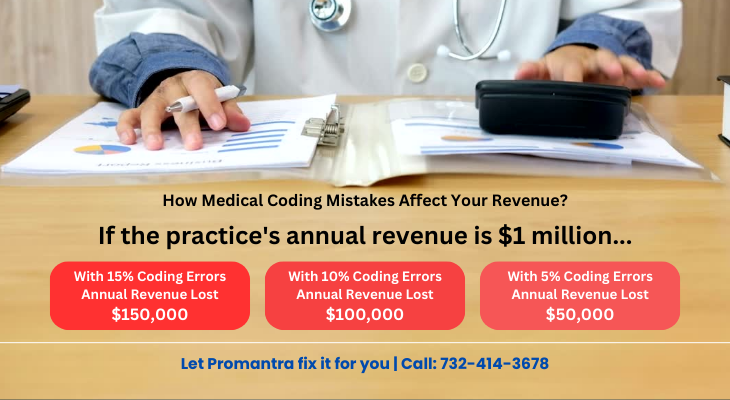How Medical Coding Mistakes Affect Your Revenue?
Accurate medical coding is critical for providers to receive proper reimbursement for their services. However, even minor errors in medical coding can significantly impact revenue.
Medical coding services
Promantra, a leading healthcare revenue cycle management solutions provider, offers comprehensive medical coding services that help practices avoid coding errors and increase revenue. As one of the top medical coding companies, Promantra specializes in outsourced medical coding, ensuring accurate and timely coding for healthcare providers.
By leveraging Promantra’s expertise in medical coding, practices can benefit from several key advantages. Firstly, Promantra’s certified coders stay updated with the latest coding guidelines and regulations, minimizing the risk of coding errors and ensuring compliance. This reduces the chance of claim denials and delays, improving revenue cycle efficiency.
Promantra’s rigorous quality assurance processes also guarantee accurate coding, reducing undercoding or overcoding that can lead to revenue loss or audits. Our team also conducts regular audits and provides feedback, helping practices identify areas for improvement.
Let us now explore the consequences of medical coding mistakes, provide a few examples of how such errors can result in substantial financial losses, and explain why Outsourcing Medical Coding Services to Promantra can be beneficial.
The Importance of Accurate Medical Coding:
Medical coding involves assigning standardized codes to medical procedures, diagnoses, and treatments. These codes are used for billing, and statistical analysis. Accurate coding ensures that healthcare providers are appropriately reimbursed and that patient records are complete and accurate.
Consequences of Undercoding:
Undercoding occurs when a healthcare provider fails to assign the appropriate code that fully reflects the complexity and intensity of the service provided. This can result in reduced revenue, as the reimbursement may not adequately cover the cost of the procedure.
Example: Consider a scenario where a surgeon performs a complex surgical procedure but mistakenly assigns a code for a less complex procedure. As a result, the provider receives a lower reimbursement, leading to a revenue loss of thousands of dollars.
Consequences of Overcoding:
Overcoding is the opposite of undercoding and occurs when a healthcare provider assigns a higher-level code than necessary. While overcoding may seem advantageous regarding reimbursement, it can lead to audits, penalties, and legal repercussions.
Example: Suppose a physician billed a patient for a comprehensive visit when a routine visit was performed. If this coding mistake is detected during an audit, the provider may face fines, repayment demands, or exclusion from participating in specific insurance networks.
Impact on Revenue:
Medical coding mistakes can directly impact a provider’s revenue stream. These errors can result in delayed or denied claims, leading to cash flow issues for healthcare organizations.
Example: Consider a case where a medical practice consistently makes coding errors, resulting in a 10% reduction in reimbursement. If the practice’s annual revenue is $1 million, the coding mistakes would lead to a loss of $100,000 each year.
Mitigating the Risk of Medical Coding Mistakes:
- Training and Education: Healthcare providers should invest in ongoing training and education so that the coders are aware of the coding regulations and guidelines .
- Regular Audits: Conducting regular internal audits can help identify coding errors and correct them before claims are submitted. This proactive approach can minimize revenue loss and reduce the likelihood of audits from insurance companies.
- Utilizing Technology: The use of advanced coding software and electronic health record systems can help streamline coding processes, reducing the likelihood of errors and providing real-time feedback to coders.
Common coding errors in healthcare providers include:
- Not Coding to the Highest Level of Specificity: Medical coders should code to the highest level of specificity based on the information provided in the medical reports. Failure to do so can result in undercoding, which can lead to reduced reimbursement.
- Unbundling Codes: Unbundling occurs when multiple CPT codes are used for parts of a procedure instead of a single comprehensive code. This can lead to overbilling and potential audits.
- Upcoding: Upcoding happens when patients are billed for more complex procedures than received or when services are billed but not performed. Upcoding can result in fraudulent claims and may lead to fines and penalties.
- Inadequate Documentation: Insufficient or missing documentation can lead to denied claims, underpayment, overpayment, or legal repercussions. Healthcare providers must ensure all necessary information is included in the documentation to support the claims.
- Failure to Check National Correct Coding Initiative (NCCI) Edits: NCCI edits identify code combinations that should not be reported together. Failing to check these edits when reporting multiple codes would result in claim denials and in turn result in potential revenue loss.
- Incorrect Use of Modifiers: Modifiers provide additional information about a service or procedure. Improper use of modifiers, such as appending inappropriate modifiers or not appending the appropriate ones, can lead to claim denials and coding errors.
- Lack of Communication: Communication between medical coders and healthcare providers is essential to clarify any ambiguities in medical reports and ensure accurate coding. Regular communication can help prevent coding errors and improve coding accuracy.
- Failure to Keep Up with Coding Updates: Medical coding sets, such as ICD-10, CPT, and HCPCS, are regularly updated. Coders must stay updated to avoid coding errors and claim rejections.
Accurate medical coding is vital for healthcare providers to maintain a healthy revenue stream. Understanding the consequences of coding mistakes, such as undercoding and overcoding, is crucial for healthcare organizations to avoid financial losses and potential legal issues. By investing in training, conducting regular audits, and leveraging technology, providers can mitigate the risk of coding errors and ensure their revenue is maximized while maintaining compliance with coding guidelines and regulations.
Outsourcing medical coding to Promantra allows practices to focus on patient care while leaving the coding complexities in expert hands. Promantra empowers practices to optimize their financial performance and deliver quality healthcare services by streamlining coding processes, improving accuracy, and maximizing revenue.




